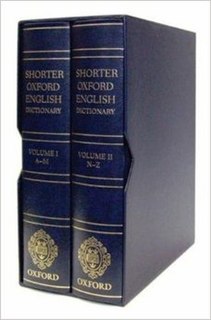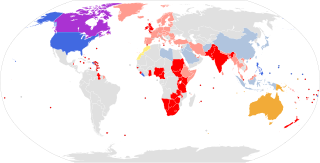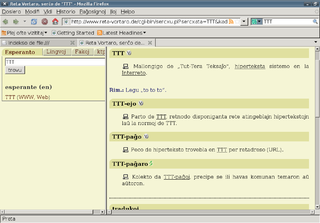Canadian English is the set of varieties of the English language native to Canada. According to the 2016 census, English was the first language of more than 19.4 million Canadians or 58.1% of the total population; the remainder of the population were native speakers of Canadian French (20.8%) or other languages (21.1%). A larger number, 28 million people, reported using English as their dominant language. Of Canadians outside the province of Quebec, 82% reported speaking English natively, but within Quebec the figure was just 7.5% as most of its residents are native speakers of Quebec French.

The Oxford English Dictionary (OED) is the principal historical dictionary of the English language, published by Oxford University Press (OUP). It traces the historical development of the English language, providing a comprehensive resource to scholars and academic researchers, as well as describing usage in its many variations throughout the world.

Wiktionary is a multilingual, web-based project to create a free content dictionary of terms in all natural languages and in a number of artificial languages. These entries may contain definitions, images for illustrations, pronunciations, etymologies, inflections, usage examples, quotations, related terms, and translations of words into other languages, among other features. It is collaboratively edited via a wiki. Its name is a portmanteau of the words wiki and dictionary. It is available in 182 languages and in Simple English. Like its sister project Wikipedia, Wiktionary is run by the Wikimedia Foundation, and is written collaboratively by volunteers, dubbed "Wiktionarians". Its wiki software, MediaWiki, allows almost anyone with access to the website to create and edit entries.

The Concise Oxford English Dictionary is probably the best-known of the 'smaller' Oxford dictionaries. The latest edition of the Concise Oxford English Dictionary contains over 240,000 entries and 1,728 pages. Its 12th edition, published in 2011, is used by both the United Nations and NATO as the current authority for spellings in documents written in English for international use. It is available as an e-book for a variety of handheld device platforms. In addition to providing information for general use, it documents local variations such as United States and United Kingdom usage.

The Macquarie Dictionary is a dictionary of Australian English. It is generally considered by universities and the legal profession to be the authoritative source on Australian English. It also pays considerable attention to New Zealand English. Originally it was a publishing project of Jacaranda Press, a Brisbane educational publisher, for which an editorial committee was formed, largely from the Linguistics department of Macquarie University in Sydney, Australia. It is now published by Macquarie Dictionary Publishers, an imprint of Pan Macmillan Australia Pty Ltd. In October 2007 it moved its editorial office from Macquarie University to the University of Sydney, and later to the Pan Macmillan offices in the Sydney central business district.

The Shorter Oxford English Dictionary (SOED) is an English language dictionary published by the Oxford University Press. The SOED is a two-volume abridgement of the twenty-volume Oxford English Dictionary (OED).

Despite the various English dialects spoken from country to country and within different regions of the same country, there are only slight regional variations in English orthography, the two most notable variations being British and American spelling. Many of the differences between American and British English date back to a time before spelling standards were developed. For instance, some spellings seen as "American" today were once commonly used in Britain, and some spellings seen as "British" were once commonly used in the United States.
Angewandte Chemie is a weekly peer-reviewed scientific journal that is published by Wiley-VCH on behalf of the German Chemical Society. Publishing formats include feature-length reviews, short highlights, research communications, minireviews, essays, book reviews, meeting reviews, correspondences, corrections, and obituaries. This journal contains review articles covering all aspects of chemistry. In 2018 its impact factor was 12.257, and it was ranked 17th out of 172 in the subject category "chemistry, multidisciplinary."
Japanese dictionaries have a history that began over 1300 years ago when Japanese Buddhist priests, who wanted to understand Chinese sutras, adapted Chinese character dictionaries. Present-day Japanese lexicographers are exploring computerized editing and electronic dictionaries. According to Nakao Keisuke (中尾啓介):
It has often been said that dictionary publishing in Japan is active and prosperous, that Japanese people are well provided for with reference tools, and that lexicography here, in practice as well as in research, has produced a number of valuable reference books together with voluminous academic studies. (1998:35)
Geiriadur Prifysgol Cymru (GPC) is the only standard historical dictionary of the Welsh language, aspiring to be "comparable in method and scope to the Oxford English Dictionary". Vocabulary is defined in Welsh, and English equivalents are given. Detailed attention is given to variant forms, collocations, and etymology.
Daijirin is a comprehensive single-volume Japanese dictionary edited by Akira Matsumura, and first published by Sanseido Books in 1988. This title is based upon two early Sanseidō dictionaries edited by Shōzaburō Kanazawa, Jirin and the revised Kōjirin.
A Dictionary of Canadianisms on Historical Principles (DCHP) is available in a 1967 edition and in a 2017 expanded, updated and partially revised edition. DCHP is a historical usage dictionary of words, expressions, or meanings which are native to Canada or which are distinctively characteristic of Canadian usage though not necessarily exclusive to Canada. The first edition was edited by Walter S. Avis (ed.-in-chief), C. Crate, P. Drysdale, D. Leechman, M. H. Scargill, C. J. Lovell, and published in 1967 by W. J. Gage Limited.
The Australian Oxford Dictionary, sometimes abbreviated as AOD, is a dictionary of Australian English published by Oxford University Press.
JMdict is a large machine-readable multilingual Japanese dictionary. As of February 2021, it contained Japanese–English translations for around 191,000 entries, representing 267,000 unique headword-reading combinations. The dictionary files are free to use with attribution and have been widely adopted on the Internet and are used in many computer and smartphone applications. The project is considered a standard Japanese–English reference on the Internet and is used by the Unihan Database and several other Japanese–English projects.
The Australian National Dictionary: Australian Words and Their Origins is a historical dictionary of Australian English, recording 16,000 words, phrases, and meanings of Australian origin and use. The first edition of the dictionary, edited by W.S. Ramson, was published in 1988 by Oxford University Press; the second edition was edited by Bruce Moore at the Australian National Dictionary Centre and published in 2016.

Reta Vortaro is a general-purpose multilingual Esperanto dictionary for the Internet. Each of the dictionary's headwords is defined in Esperanto, along with additional information, such as example sentences, to help distinguish the subtle shades of meaning that each particular word form may have.
The English Pronouncing Dictionary (EPD) was created by the British phonetician Daniel Jones and was first published in 1917. It originally comprised over 50,000 headwords listed in their spelling form, each of which was given one or more pronunciations transcribed using a set of phonemic symbols based on a standard accent. The dictionary is now in its 18th edition. John C. Wells has written of it "EPD has set the standard against which other dictionaries must inevitably be judged".
A historical dictionary or dictionary on historical principles is a dictionary which deals not only with the latterday meanings of words but also the historical development of their forms and meanings. It may also describe the vocabulary of an earlier stage of a language's development without covering present-day usage at all. A historical dictionary is primarily of interest to scholars of language, but may also be used as a general dictionary.
Walter Spencer Avis was one of the foremost Canadian linguists of his day. Throughout the 1950s to his death at age 60, Avis' mission has been described as "plant[ing] into the minds of his compatriots the notion of Canadian English (CanE) as related but different from other "Englishes"."
Margery Fee is a professor emeritus of English at the University of British Columbia (UBC). From 2015 to 2017, Fee was the Brenda and David McLean Chair In Canadian Studies at UBC. She publishes in the fields of Canadian, postcolonial and Indigenous studies and Canadian English usage and lexicography.






